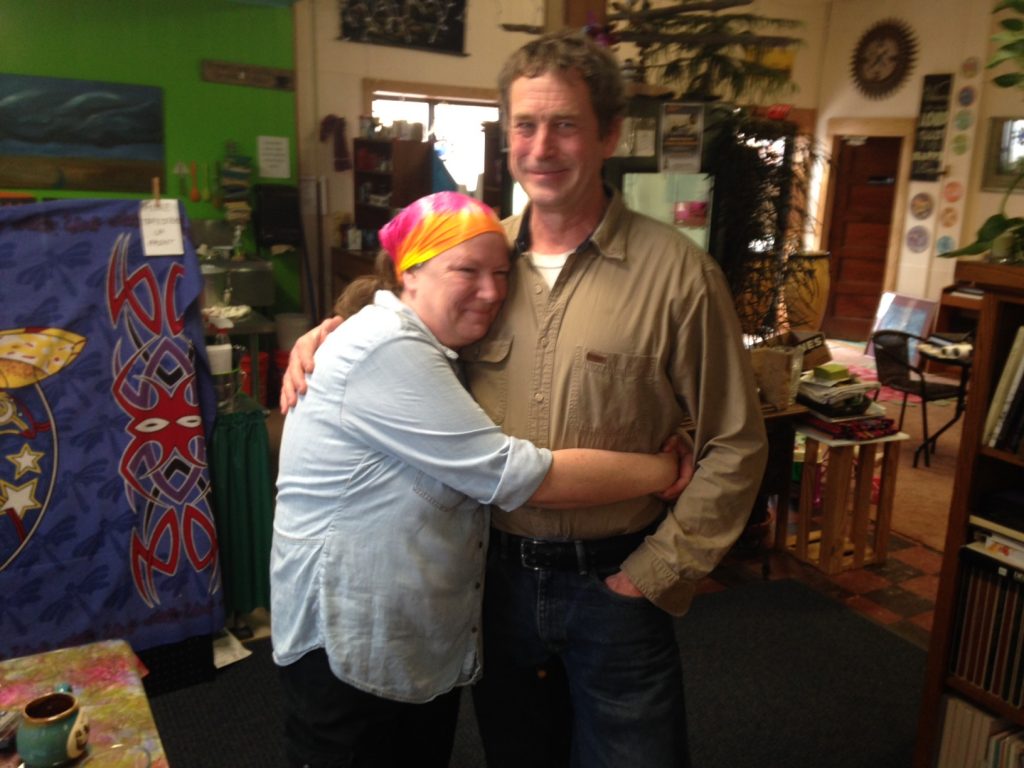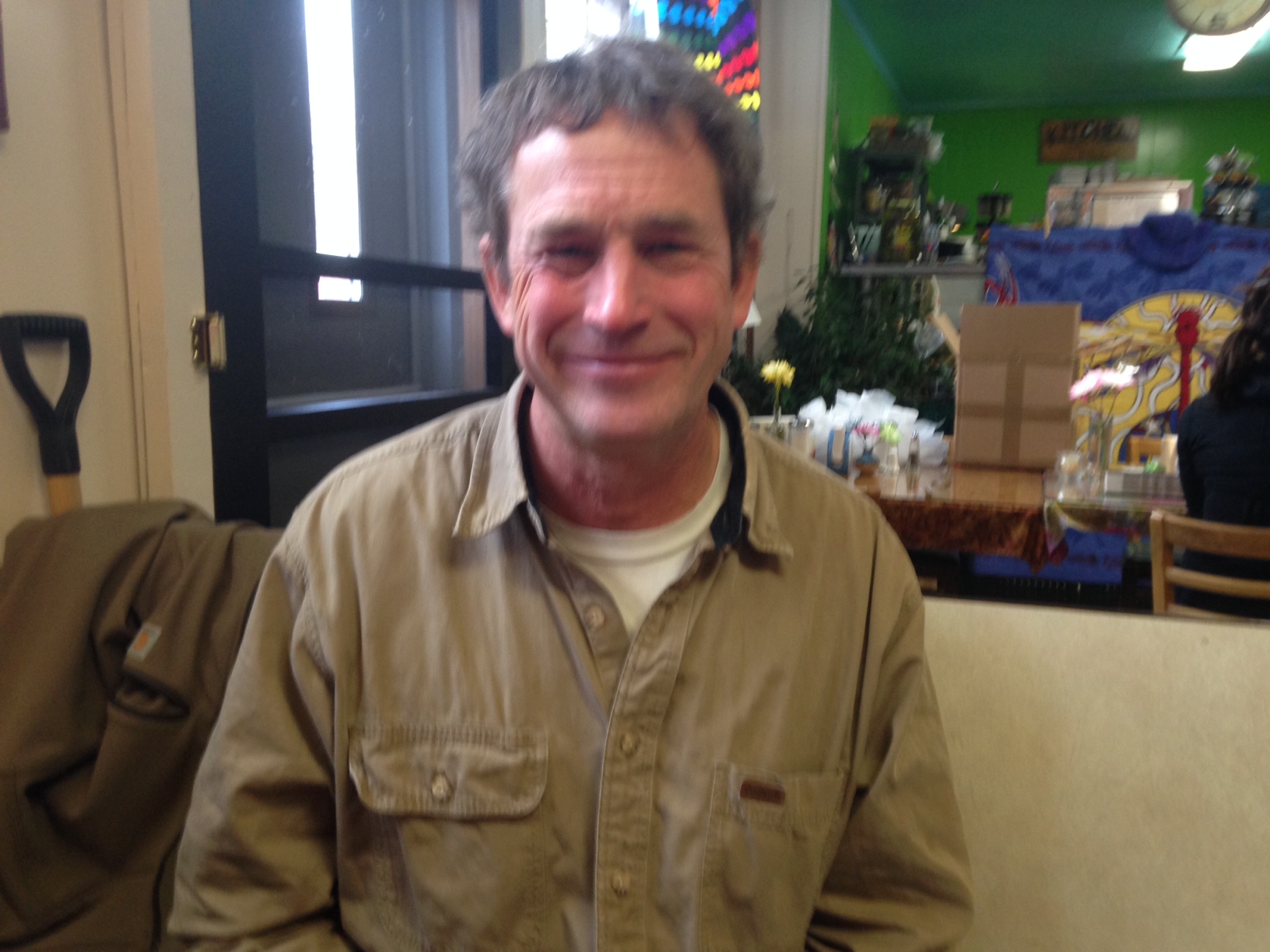Brian Cabell talks to a fascinating personality, Dan Perkins. He owns a roofing business but, more important, he founded the Partridge Creek Farm, an educational farming organization that’s taking revolutionary steps to grow crops in Ishpeming, teach young people how to farm, and create jobs for a community that sorely needs them.
BC: Where were you born?
DP: I was born in Manhattan. My parents were both teachers. My father brought his love of farming to the Catskills and brought inner city kids up to his farm in the Catskills and that farm is still in operation today, though he no longer owns it.
BC: What were you like as a boy?
DP: I wasn’t popular in school, I wasn’t in sports. When my father started farming, I found a love for work on the farm and defined myself as a worker and a farmer.
BC: Did you get into trouble when you were younger?
DP: Not too much, nothing serious. I was more of the hippie, alternative type. I smoked pot and carried on, you know.
BC: What were your aspirations as a youngster? What did you want to be when you grew up?
DP: I saw myself as a farmer. I really expected to be a farmer. I didn’t expect to go into construction but when my father lost his farm for financial reasons, I saw that dream kind of vaporize.
BC: So you travelled a bit.
DP: After graduating college in Connecticut, I travelled all over the world to organic farms. I worked on farms in Spain, France and California. Then I did commercial fishing up in Alaska and afterwards I started a construction company in Massachusetts. Then ten years later I met my wife and we moved to the U.P. where she grew up.
BC: Ishpeming? It doesn’t seem like a natural fit for you and some of your political and social views.
DP: I see Ishpeming as representative of our nation’s problems and I see it as perfect-sized petrie dish for testing my theories on how we can save our country–our health problems, our community problems, our disassociation with each other. We’re a very isolated people even though we’ve got all these ways of communicating. It started with the insular family, the single family home concept. An agricultural economy, on the other hand, is very community-oriented. I’d like to bring that back and I think that’s a key to getting the kids off of drugs and to get them working and to get them involved with the community and in society.
BC: Many people associate you with roofing. We see you on TV. Why roofing?
DP: When I was a general contractor, you had to know everything. It was a very difficult career and you were always under stress to keep your prices low because you were always bidding against a slew of people. And what I noticed was that the people who installed the gutters or the dry wall or did the painting–very standard, repetitive trades–they were doing better than I was. When it finally hit home for me was when I went to a gutter-installer’s party and I found that he was living in a half-million dollar home. I said to myself, “This guy’s just putting in gutters and he’s a millionaire!” That’s when I realized I needed to have a trade like that. I needed to be specialized.
BC: Where did the inspiration for the Partridge Creek Farm come from?
DP: My love of gardening turned into a big family garden in the back of our yard. We live in a fairly poor neighborhood of Ishpeming and the kids would just show up. They had nothing to do, they didn’t go to sports events, so they just showed up and we put them to work. And we started giving them vegetables and they started seeing an avenue to their salvation. They got excited about it and they became included in the community that had pretty much dropped them. So then I wanted to make it bigger and we formed a Board and a 501c3–a non-profit in 2013.
BC: But you’ve had some problems, at least initially.
DP: We’ve stumbled a little bit trying to figure out where we’re going to get the land and do it in the city. Getting people on board with the concept is not always easy. Our biggest struggle has been trying to get the city on board. We’re asking them to open up their minds to a new way of looking at public lands. This isn’t about zoning or ordinances or anything like that. Ishpeming has 26 parks and most of them are not maintained. Most of them are just backlot alley type land where nobody maintains them. Opening them up to public use is going to require some thought and some planning. As we start to see what Partridge Creek Farm could do to the culture and community of Ishpeming…and the land values…I think the city will become much more open to this type of development.
BC: Where do you see the farm in ten years?
DP: In ten years, I see Partridge Creek as a multi-million dollar operation with many farm locations, completely integrated with the schools and several other county organizations and the university. We’ll be producing a tremendous amount of agriculture and lot of new farmers and workers in the agricultural and food processing industries.
BC: How would you describe your political beliefs?
DP: I’ve always voted Democratic but I’m beginning to look at it as the Democratic and Republican wings of the ruling party, and I don’t think that’s helpful to us. Everything from social services to community health and our whole health care system, I think we need to re-design locally to provide examples for a more efficient and effective manner of governance.
BC: Aside from your work as a roofer and your work with Partridge Creek, what else do you do?
DP: I go cross country skiing and walk through the woods with my dog. That’s my release. I like to be outside, not on a machine but in the woods, on my feet in the woods with my puppy.
BC: You’ve been married for 25 years. What’s the key to a good marriage?
DP: Being too busy to get in each other’s way. (Laughs) We support each other well most of the time. We don’t have any of the major problems that screw up marriages like being alcoholics. We both work very hard. I tell my daughters I don’t care who you marry but what matters to me is that you marry someone who works.

BC: You have three children. What is your hope for them?
DP: I want them to be happy. One of the most important parts of being happy is that we feel like we’re valuable members of society, that we provide something for our fellow man. That we earn our keep.
BC: Are we living in just a crazy, chaotic world that’s been thrown together or do you believe there’s some plan or design to it?
DP: I honestly feel we chose to be here. We don’t know how or why or where we came from but there was an energy that we have that was positive when we arrived. We said “We gotta take a shot at this.” We have a brief little moment, like a spot of water coming out of a waterfall, and then re-entering it. That’s the way I look at it. We have an opportunity for conscious evolution of our race. We can actually change our race. That should be our goal–a conscious evolution to make ourselves better.
BC: And your epitaph?
DP: That I was an artist in life. That I had a creative side to my artistic manifestation of my life.
BC: Thank you, Dan.


